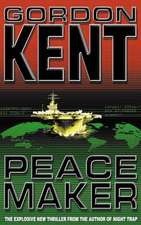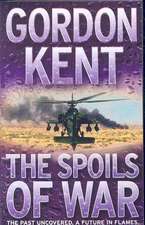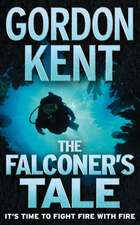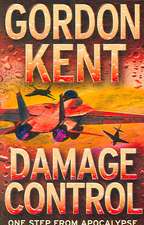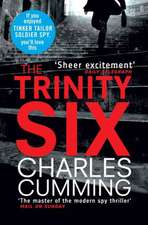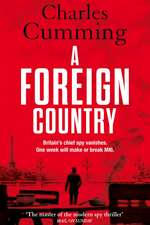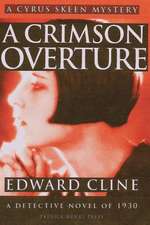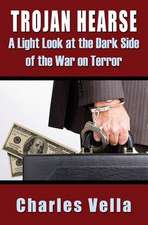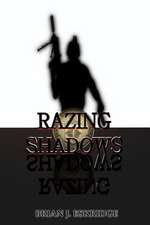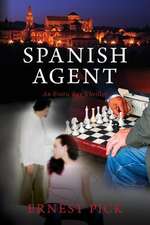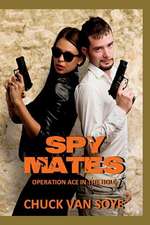Top Hook
Autor Gordon Kenten Limba Engleză Paperback – 3 noi 2002
| Toate formatele și edițiile | Preț | Express |
|---|---|---|
| Paperback (2) | 52.63 lei 3-5 săpt. | |
| dell – 28 feb 2003 | 52.63 lei 3-5 săpt. | |
| HarperCollins Publishers – 3 noi 2002 | 104.11 lei 3-5 săpt. |
Preț: 104.11 lei
Nou
Puncte Express: 156
Preț estimativ în valută:
19.93€ • 20.72$ • 16.67£
19.93€ • 20.72$ • 16.67£
Carte disponibilă
Livrare economică 22 februarie-08 martie
Preluare comenzi: 021 569.72.76
Specificații
ISBN-13: 9780006512967
ISBN-10: 0006512968
Pagini: 594
Dimensiuni: 111 x 178 x 37 mm
Greutate: 0.4 kg
Editura: HarperCollins Publishers
Locul publicării:United Kingdom
ISBN-10: 0006512968
Pagini: 594
Dimensiuni: 111 x 178 x 37 mm
Greutate: 0.4 kg
Editura: HarperCollins Publishers
Locul publicării:United Kingdom
Notă biografică
Extras
Venice.
THE STREETS WERE A RIVER OF COLOR IN THE DARK, sequins and silks swirling around bare flesh. Masks and cloaks fought the assault of the rain and the splashes of the sea underfoot. Costumes flowed toward San Marco, just as the tide of the Adriatic ebbed away, leaving salt puddles to reflect the glare of carnival.
The pounding music from the palazzi and the manic orchestration of voices, Italian and foreign, stunned Anna’s senses as she ran. Her masculine costume had saved her in the seconds when the meeting had gone bad, and now it freed her to move, thrusting through the tangle of the crowd. The sword at her side caught at passersby until she took the sheath in her left hand and lifted the hilt off her hip.
She stopped with her back against a medieval shop at the base of a bridge. Music pulsed through the stone at her back, and her lungs burned as she peered around the corner at the arch of the footbridge. Two lovers embraced against the stone railing; a reveler in a black cloak and white Pantalone mask strode past her toward the bridge. At the top of the arch stood another of the Serbs who had tried to kill her, talking into a cellphone, his head moving like an owl’s. None of the Serbs had bothered to wear masks or costumes; all had leather jackets and mustaches. High on adrenaline, she drew the sword and shrugged off her cloak in one unconsciously dramatic motion. She gathered the cloak in her left hand and risked one glance back into the thick of the crowd. Then she drew herself up and flung herself around the corner at the bridge.
Because the Serb was talking, he was slow. She rushed past the Venetian in the white mask, his dignified walk and cloak screening her for an extra second. She threw her own cloak with both hands, and the Serb shot at it on instinct. His second shot buzzed in her ear as she took a last step and leaped, lunging forward, her whole weight driving the point of the smallsword through his neck. The blade grated against the vertebrae and she rolled her wrist and used the speed of her rush to tear the blade free. Momentum carried her past her victim, and she stumbled, caught herself on the railing, and leaped to the parapet of the bridge.
The reveler’s white mask turned to the movement, black eye sockets locked on her. One of the lovers had been hit by a shot, and the Serb’s open throat pumped red blood on the gray stones. A second’s balance on the parapet as her mind recorded the copper scent and the sheen of blood, and she dove into the canal. The unwounded lover screamed.
The shock of the water cut off the screams, and she swam, eyes and mouth shut tight. She stayed down, lungs bursting from the run and the adrenaline, until her hands found the opening and she thrust herself through and up into the tiny space of a partly submerged chapel, lightless, silent. For an entire minute, she could do nothing but breathe, supporting herself on a stone that had been the base of the altar.
She snapped on a tiny flashlight whose glow reflected off gold leaf and mosaic.
Anna rolled into her waiting canoe, half filling it with water, and sat up. Her right hand still clutched the sword, and she pushed it under the bag in the front of the boat and played the tiny beam of light around her. The chapel had been a military one, eight hundred years ago; she hadn’t noticed it when she had entered at low tide. Now, she watched the ceiling as the tide ebbed and her escape route cleared. A Byzantine Saint Michael held aloft a sword of light and threatened Satan; a figure in armor at the far end looked to her like Saint Maurice or was it Saint George?
She shivered. She had never killed before. She didn’t like it.
She pulled a travel book from her pack and opened it to the last page. She had written four names there in Arabic script, in an old Persian language that was better than a code. She studied them in the flashlight’s inch-wide beam.
Her lips thinned and she shook her head at the first name George Shreed.
Suburban Virginia.
Sitting in his house alone, George Shreed stared at a dead computer screen and listened to the absence of his wife. She was dying in a hospice, and the house was dying with her, devoid now of her voice, of the smells of her cooking, of her off-tune singing. Thirty years of marriage create a lot of sound, and now it had all drained away, and he was alone.
He booted up one of his computers. Three monitors sat on tables in the small “study.”He could communicate directly with his duty officer at the Central Intelligence Agency, or with several distant mainframes on which he kept coded and secret files, or with the vast world of electronic magic that a few years before had hardly existed.
“Janey,”he murmured. It was not as if he meant to call her back from the edge of death, but only that he had to say her name sometimes, as if, left unsaid, the name too would disappear and he would have nothing.
“Oh, God,”he muttered.
Shreed was frightened. Horrors never came alone: first, his wife’s cancer; now, the woman in Venice. He had just learned that his people hadn’t caught her, so she was still out there, still running around with evidence that could send him to prison for life.
Two weeks ago, she had made her first contact: an e-mail with a photograph that he had first sent two years before, encrypted, to an Internet address where it could be accessed by Beijing. Shreed had been stunned to get it back, a hand reaching out of the past to strangle him.
Ten days ago, the woman had e-mailed him a page of classified material about a project called Peacemaker, classified material that Shreed himself had covertly sent to his Chinese control in 1997. The Agency would have him for treason if they knew he had transferred it. With it had been a curt message: “Venice, Old Ghetto memorial, 16 March, one million dollars.”
Then he had sent people to find her, and she had escaped.
And she had sent him a second message: “Now the price is two million.”
The computer screen was bright. He punched keys, and icons and prompts flew by. He moved out into cyberspace, entered a mainframe on a university campus two thousand miles away and called up a file that appeared as random symbols and letters on his screen. He keyed in a password, then another, then empowered an algorithm that ran in tandem with a checker within the file itself, and then he was in, and the symbols in the blink of an eye became words.
Project Peacemaker.
Janey didn’t know about this part of his life. Nobody knew, in fact. Not true, some people in China knew. But Janey and his colleagues at the CIA didn’t know. He didn’t give a shit about the colleagues, but he was deeply guilty that he had hidden part of his life from Janey, who was his life, for so many years. He would have to tell her, he knew. Tell her the way people tell a priest, there in the humming silence of her hospice room, tell her as she lay full of painkillers, needles in her arms, tell her as if she were the wall with the little wicket of the confessional. And say, Forgive me, Janey, forgive me before you go. Even though she wouldn’t have heard him, most probably.
Shreed went through the Peacemaker file. He needed a fall guy, or at least a diversion, somebody to take the heat of an investigation if this damned woman in Venice decided to go to the Agency.
He needed time.
Peacemaker had failed two years ago, a very promising project that hadn’t worked right, in the end. He had backed it as a weapon with real potential, and he had leaked data about it to Beijing, and the Chinese had made too much stink about it, and Peacemaker had been aborted by the White House as “destabilizing.”The Agency had been nosing around ever since about how the information had leaked, and if the finger ever pointed at him, there would be a disaster.
He needed a scapegoat.
He had to find somebody likely. He was not, himself, likely, that was the good part. He had been too visible in the project, one of its main sponsors. What he needed was somebody who had not been quite so visible, somebody about whom you could say after the fact, Oh, sure, now I see what that guy was doing, he was spying for the Chinese the whole time. Somebody who would have had to exert a little extra to find things out. Not quite a munchkin, but not quite a master of the universe, either. He began to go down lists of names. No, no, no, maybe, no. He smiled, a somewhat wolfish expression on his lean face. He had just come to the name of his own personal assistant, Ray Suter. Assistants were expendable, and Suter was a real bastard, but he was too closely associated with Shreed himself. Suspicion, like tar, sticks to everybody in the vicinity.
Who, then?
Name after name. Not quite right. Completely wrong. Impossible. Maybe. And then,
Shreed grinned.
Rose Siciliano.
She’d been the Seaborne Launch Officer on the project. Walled off from the Eyes-Only stuff but very much in on all the computer magic, the trajectory and targeting data. If she’d actually been the spy, she could have, with some snooping and some late hours and a certain amount of risk, busted the security and reported the deep stuff to Beijing. She’d even had a computer geek, an EM named Valdez (a name he’d already dismissed) whom she was always quoting about the data stream and stuff she wasn’t being allowed to see. Perfect behavior for a spy.
Or at least the CIA investigators would see it that way.
And she was Alan Craik’s wife. And he owed Craik one, the little shit. They’d hated each other for years. His grin widened as he thought about it: if the wife was accused of passing secrets about Peacemaker, the husband was sure to be suspected, too. Tar sticks.
Shreed glanced at his watch. He was due at the hospice to sit with Janey.
He hit a button and highlighted the name.
Rose Siciliano.
Newport, Rhode Island.
The Cessna 180 held steady at 5,600 feet. At the controls, Rose Siciliano flew with the unconscious ease of a seasoned pilot, helicopters, now heading for astronaut training. Next to her, her husband glanced over the gauges and listened briefly to the Quonset tower. That was mostly the way it went, she flew and he kibitzed and ran the radio. Now, he put his hand on her knee, and her hand came down to cover his, and she flashed him a grin.
“It’s been a great couple of years,”he said.
She nodded, looked aside. Below, the Rhode Island coast was spread out for them on a sparkling day, Quonset Naval Air Station in her near foreground as they came around for their approach. They had been here two years and now they were leaving, both lieutenant-commanders, both at the Naval War College, both taking a quiet tour after some very hairy sea duty. And in two weeks it would be over.
“Gonna miss it,”he said.
“You bet.”Her normally husky voice was even a shade raspier. She had had their second child here. They had been happy. “Like real people,”she growled. Like civilians, she meant. Now, it was off to the CIA’s “Ranch”for him, astronaut training for her. Great moves for both of them, exactly what they wanted, but, She squeezed his hand. “We’ll look back on it,”she said.
“Hey!”He squeezed her leg, laughed. “Come on! Life is good. What can go wrong? We’re us.”
She grinned again, then leaned way over to kiss his cheek.
But what could go wrong? He was LCDR Alan Craik, off to the Ranch, the CIA’s arduous school for spies; she was LCDR Rose Siciliano, off to conquer the stars. What could possibly go wrong?
He got on the radio, and she banked the plane and descended, and then both of them were absorbed into the routine of headings and altitudes, and they went down and down and around and she brought it in on the center line of the runway, the wheels touching with a bump and squeal, and the ground raced along under her, and she was happy.
ROSE LEARNED how fast things could go wrong when they got home. He was already indoors; she had put the car away and gathered up their stuff, and she was standing in the front door of their rented house, looking down the long central corridor at his study. He stood there, back to her, telephone at his ear. She knew that stiff posture and long neck and what they meant: rage.
Mikey, their seven-year-old, knew it, too. And he knew the Navy. “His detailer,”he said, with the wisdom of a child who had grown up in the Navy. The baby-sitter, also a Navy child, nodded.
Rose started down the hall. Calls to your detailer were life-changing: your detailer helped plan your career, generated your orders.
Alan hadn’t said a word yet. She had almost reached him when she heard him say, “Understood,”and he slowly hung up and then gathered the cordless phone and its cradle in one hand and threw it across the study. It smashed against the far wall; Rose flinched as bits of plastic flew.
“Those bastards!”he shouted. His face was contorted with anger. “Those bastards have changed my orders!”
Going to the Ranch had been a big deal. Their pal Harry O’Neill had urged it. It was a logical step for a hotshot whose squadron days were over, he said, move into the covert world and go where the action was.
“Why?”she said.
“How the fuck do I know why? They won’t tell me why!”
“But, honey, “
He came down a little, his anger never hot for long. “They’re sending me to some rinky-dink experimental project. Month at sea, then, the detailer doesn’t know.”
“Tell them you won’t accept the orders!”
He blew an angry sigh through puffed mouth. “The detailer doesn’t advise it.”He bent to pick up the telephone and tried to fit two broken pieces of plastic together. “Not going to the Ranch, Rose, It’s as if they don’t trust me all of a sudden.”He stood there, holding the pieces as if they were emblems of his helplessness. “All of a sudden, I’m a pariah.”He looked up at her in anguish. “Why?”
Tar sticks.
“Oh, shit.”He sat on the stair. “I’ve got to be in Trieste, Italy, in four days. I’m going to miss my own fucking graduation from the War College!”
Venice.
Efremov was dead.
Anna had awakened to feel his body cooling in their bed, the bed she had shared with him for five years. She had checked for a pulse, respiration, but they were last acts of friendship, quite separate from hope. He was dead. She had left Tehran the same day.
Now, his death would be known throughout his world. As he had prepared her for so many things, so he had prepared her for this, with suggestions and instructions, a locked box, passports, and computer disks. She had begun the contacts with his former agents even as she had fled Iran.
She had found safety and anonymity in a youth hostel in Istanbul. She was twenty-six and beautiful, but she looked a mature twenty, and she had bought a passport and a student card from Israel to have a twenty-year-old’s identity. In Istanbul, she had used the cyber-café around Hagia Sophia to contact a man who was only a name on a secret file, George Shreed. Shreed had hired the Serbs to kill her in Venice.
Now, one of them was standing under an arch outside her window. They had found her.
She was sharing a room, a very expensive room, with a stewardess from Lufthansa. Greta was on vacation and avoiding airlines, and they had met at the Hermès shop near the Doge’s Palace, not entirely by accident, Anna had been looking for cover. Greta wanted adventure, a little romance, a man to last a few days. Anna made herself the ideal companion, which included listening to Greta’s complaints about the man she had picked up.
“American?”
“Australian, ma cherie. Rude and a little unwashed. Too rude, in the end.”
“Mine never made the assignation.”
“Cowards, all of them.”
Greta emerged from the shower wearing nothing but a towel on her head. Anna admired her candidly; Greta lacked Anna’s legs and hips, but she was striking, and her breasts were enviable. Greta seemed unaware of Anna’s gaze and collapsed theatrically on her bed.
“Shopping will cure it. And I want to go to the Rialto.”
“Is the Gap in Venice any different from the one in London?”Anna had never been to London, but her passport said she had.
Greta laughed, a silly girl’s laugh. “I know where to shop, here.”
“You’ll get me in trouble.”
“Probably.” They both laughed. Greta was very easy to like, Anna thought. She had confidence and enthusiasm that went deeper than the automatic smile of the airline employee. Anna pulled on a top, glanced out the window, half pulled the heavy green drape, and moved from her own bed to the room’s desk with her laptop. Greta began rifling her purse, throwing her passport and wallet on the bed. They caught Anna’s eye, like a signal. She glanced out the window again.
“Do you have a laptop? Mine keeps freezing on the keyboard.”Actually, it was working quite well. Anna just didn’t want to be tracked.
“Of course, ma cherie. It is there, by the television. But it is probably the phone lines. They are antique, like everything else in Venice.”
Anna found the case, slipped down behind the chair next to the television, and connected to the net. The machine was very different from the succession of IBM laptops Efremov had always acquired for them. It had a fashion edge to it. The case was an after-market replacement, a deep, velvet blue.
“The case is wonderful!”
“It is, isn’t it? A boy gave it to me.” Greta’s voice suggested a deep satisfaction with the case, or the boy. Perhaps both.
Online connection. All the directions in German, but her German was up to the task. Greta spoke a movie-star English, but Anna’s stilted German had started the hasty friendship and established her bona fides as the child of Austrian Jews.
Search Engine. The second name from her list. Alan Craik. Several hits. A Navy locator address. Anna flicked her eyes over the street outside; the watcher had a cellphone out. She read two short bios of the man Craik, service, medals, marriage. Naval War College.
She searched again on some ship names: Alan Craik was going next to an aviation detachment, that much was clear. She tried “Ombudsman” and “USS Thomas Jefferson.” Seven hits. The Americans continued to pretend that their naval movements were classified, even as their wives posted lists of ports of call on the Internet. She used the unfamiliar finger pad to scroll through the seven hits.
Exactly. Liberty ports.
Movement on the street outside. A second man, a lit cigarette. Anna scooped Greta’s documents off the end of the bed and put them in her bag without hesitation. Then she took her own expensive forgeries and dropped them on the telephone table, never taking her eyes off the street. Greta prattled on, and Anna made noises, yes, no, interesting, to suit Greta’s noises. Greta knew nothing of the men outside the window or of the sudden loss of her identity.
One last bit of information from the laptop: Alan Craik would be in Trieste, Italy, in two days.
Anna closed the laptop and returned it to its case, running her fingers over the blue. Anna loved the best things, and so did Greta. On that ground, they truly met. Greta was applying her makeup, and their eyes met in the mirror.
“I have to run out, Greta.”Anna waved her handbag. “I’ll be back in a few moments.”
Greta nodded in the mirror. Anna bit her lips in regret. Greta did not deserve what was to come, but no one did. Anna headed for the elevator.
The antique elevator was the only way she knew of getting to a lower floor. Even in Iran, there would have been fire stairs, but not in Venice. She thumbed the button. She had no gun and she feared what would emerge from that elevator.
Abruptly, while she was still trying to devise a plan to meet a rush of armed men, the door opened. One elderly woman emerged. Anna had the elevator to herself. She took two deep breaths before she thumbed the button for the first floor.
The Serbs would be in the main lobby by now.
The elevator crept down three floors, her heart hammering in time to the gentle sway of the old car within its track, and stopped with arthritic slowness. The door attempted to compensate with a harsh crash that could be heard throughout the building. They would hear that, know that someone had used the elevator to the first floor above the lobby. Anna fought down panic. They could not know it was she. Not yet. Not until they found Greta. If they could tell the difference between Greta and Anna, she was dead. She hoped they only had a description. In her experience, all desirable women looked alike to most men.
She walked to the room that corresponded to her own on the fifth floor. She had no reason for this choice, only a certain blind superstition. She breathed and knocked.
A middle-aged man in a dressing-gown opened the door. Anna smiled, her body swaying with relief. “May I come in?”she asked. The man, a North American, appeared flabbergasted. His mouth moved, but no words emerged. Anna heard the elevator going up, and up, past this floor. Up to her room on the fifth?
She slipped past him into his room. Same layout as her room above, two beds, even someone in the bath. She walked to the window, moved the blinds. Empty. She pushed the window open. The man was saying something, and the sharp retort of a gunshot came from above them. She ignored both, letting the surge of adrenaline carry her out the window. She hung from the sill and dropped. One of her stupid heels broke, but her ankle held and she stumbled away. She pulled her shoes off, threw them in the canal, ran to the corner, began planning her movements off the island of Venice and up the coast to Trieste.
Planning it in her head as she ran barefoot, Trieste . . . Alan Craik. . . .
Trieste.
Alan joined his new command, an airborne detachment testing a new imaging system called MARI, while it was moving from Pax River via NAS Norfolk and Aviano, Italy, to join the USS Thomas Jefferson at Trieste. At first, it was like flying with strangers in a commercial jet; he was CO in name only, the movement already organized by the acting CO, a lieutenant-commander named Stevens. He was still in a rage over the change of orders, so his mood was not charitable, and he found himself making harsh judgments about the unit. Movement planning seemed to him substandard, the preparations made to work only because the junior enlisted worked their butts off and the senior enlisted were pros. The officers remained an unknown quantity, faces and handshakes at Pax River, and little else, and most of them had flown off with the det’s two aircraft and would be waiting on the Jefferson.
By the time they had reached Aviano, he had at least gotten control of the anger, and he knew many of the faces, if not the names. He had made common cause with the senior chief, and they had agreed on how to improve the last leg to the ship. Then he saw to it that he was the last man to leave Aviano; that way, he knew that everything was in train, and the senior chief would get everything to the Jefferson on schedule.
He showered for the first time in two days, changed into civilian clothes at the NATO bachelor officers’ quarters, and rented a car, which he drove a little too fast into Trieste before walking down to fleet landing. The Jefferson was anchored out beyond the main harbor entrance, washed by hazy sun and a faint Mediterranean mist that gave the port a friendly look and gilded the harshness of the modern waterfront.
Now almost resigned to the change of orders and buoyed by seeing a ship he knew and felt great affection for, his mood was raised further by seeing a familiar face: Chris Donitz, an F-14 jock who had been the senior LSO on his last tour.
“Hey, Doughnuts!”
He smiled because it was obvious that Donitz was glad to see him. In an instant, shipboard camaraderie embraced him, and he listened with a smile as Donitz told him that he was heading shoreward for two days of liberty and a meeting with his wife. Donitz was just beginning to rhapsodize about meeting her in Venice when Alan heard a voice at his shoulder.
“Sorry to interrupt, sir, are you Lieutenant-Commander Craik? Message at the SP shack, sir.”
He thought, Oh, shit, trouble with the det. He shook Donitz’s hand. “Better catch your train. Give my regards to Regina.”
“You bet. But Al, listen, uh, “
Alan waited, literally balanced on one foot to walk away.
“Uh, watch your step, okay?”
That got Alan’s attention, and he swung back. “What’s that supposed to mean?”
Donitz flicked a glance at his watch and shuffled his feet. “Just some scuttlebutt about why you’re here.”
“An intel guy commanding a bunch of aviators? I can deal with it.”
“Uh, sure. Hey, take care of yourself.”
If Alan had been in less of a hurry, he would have known that Donitz had more to say. As it was, Donitz gave a quick hand gesture, part salute, part wave, and hurried through the shore-patrol sentries and down the pier toward the railway station.
Alan strolled over to the shore-patrol office. A well-turned-out jg stood inside, his creased whites gleaming. He was from the ship’s company and didn’t recognize Alan in his civilian clothes, but as soon as Alan introduced himself, the man snapped to attention.
“Sir, the previous DO left a message that your wife came by about an hour ago and said she’d wait for you in, uh, Lettieri.”He had trouble with it, and the name came out as Letty-air-yury.
“My wife?”Rose was supposed to be in Newport, getting ready to graduate.
“That’s what the message says, sir. Mrs. Craik waiting for her husband at the Letty-air-iery.’ “
“Lettieri?”Alan asked. Rose had never mentioned coming out. Of course, she wasn’t above surprising him, maybe even skipping her own graduation because he had to miss his, and they’d spend it together? Pick up a quickie flight from some friend in Transport, The thought of seeing her made him grin.
“Lieutenant, can you call the boat?”
“Yes, sir.”
“Get CVIC on the line and tell them that LCDR Craik is going to miss the 1700 brief, okay? Ask my det NCOIC to see that my stuff gets to my stateroom.”
“Aye, aye, sir.”
“Now, where is the Lettieri?”He realized that he wanted to see his wife a lot more than he wanted to see his new command.
ALAN’S EAGERNESS to see Rose saved his life.
He followed the first part of the directions from fleet landing to the Riva Del Mandrachio, which ran along the waterfront, but the next turning eluded him. The landmark for this turn had been hotly debated by two sailors of the shore patrol, one arguing for a small church, the other for a bar, both making marks on the back of an advertising flier for a rock club. Alan saw several bars, but no church. He turned southeast, away from the waterfront, and headed into town, following the crude map and asking his way in his Neapolitan Italian, to the amusement of the Triestini.
The first local he asked pointed silently up the hill and waved Alan on. The second, as if to make up for the reticence of the first, offered to take him to a much better cafe, with a beautiful waitress, where the man himself was headed. Alan declined with courtesy, and the man shrugged. He gave directions rapidly, insisting that the Caffe Lettieri was on the Via San Giorgio. Alan followed the new directions as best he could.
Ten minutes later, he was deep in the old part of the city. He passed two of the city’s foremost Roman attractions and stopped, his temper flaring. The anger about his changed orders was just below the surface again, ready to flare at any provocation. He took a deep breath, looked at his map, and began to doubt that any members of the shore patrol had got this far from the fleet landing. Then, deliberately calming himself, he walked slowly until he found a cross street whose name appeared on his map and moved briskly south toward the Via San Giorgio. By then, the sunny day had turned gray, and thin Adriatic drizzle had begun to fall, and he was hurrying because he was afraid he would miss Rose.
He had to walk for more than five minutes to reach San Giorgio, and he realized by the time he reached it that he was directly above the fleet landing; indeed, the shore patrol post was almost at his feet. The Caffe Lettieri was just ahead of him, a new, prosperous place with gold lettering on its facade. Rose’s choice of a rendezvous now made sense. He hurried to meet her, overtaking what he took to be a local man talking on a cellphone.
And then something struck him as out of place. A car had pulled up ahead of him, a big Audi 5000; the doors opened even before it had stopped, and as the doors popped feet and heads and hands appeared, fingers gripped around door frames, tension in eyes that darted back and forth at him and at the man with the cellphone. He knew those eyes, those tense hands: anticipating violence. That was his reaction, irrational, atavistic: memories of Africa and Bosnia, men going into action, high on it, super-alert.
And the man ahead of him was speaking Serbo-Croat, not Italian.
The man closed his cellphone with a snap and drew a pistol from his backpack, his eyes fixed now on the Caffe Lettieri. He looked just like the men coming out of the Audi. Almost dancing on the pavement in his anticipation.
They were going to hit the cafe.
The cafe in which his wife was waiting.
Alan lengthened his stride and stepped up behind cellphone man and took a last, careful look up the street at the car, his mind stretching the milliseconds as he tried to read what he was seeing. Weapons were appearing now from black leather jackets. One man was checking his fly, the second time he had done that: When did I see him do it? How did I notice? Another licked his lips. Looking here, there, predators’ eyes,
He took a deep, silent breath, gathered his anger and frustration and threw himself on the man with the pack, pinning his arms to his sides. His weight carried the man to the ground and the man’s head hit the pavement with a hollow thump, like a gourd meeting a cleaver. He heaved at the man, flipping him face up, gaining control of his limbs and taking the gun, a wrestling move that flowed from his past without conscious thought. He worked the slide on the pistol and rolled away, covering the head of the street, where one of the men from the Audi was opening fire into the front of the cafe.
Alan centered the sight picture on the man’s chest above the machine pistol he was using and fired twice, knocking the shooter back over the hood of the Audi. One of the other leather jackets fired back at him, walking the stream of bullets over the man he had tackled. Alan felt a blow to his leg and fired back without any attempt to aim. He raised his head and shot again on reflex, but the man who had fired at Alan had thrown himself into the car.
All Alan could think was that if it was a terrorist attack they still had time to throw a bomb, that Rose was still in danger. The car shrieked away from the curb, hitting the mirror of a parked van.
Two men were down.
Alan stumbled forward, his left leg striking oddly on the street. As he came to the corner, he saw that the whole front of the cafe had been shattered by bullets, and he threw himself forward into the cafe. He bellowed, “Rose!”
Two young men were bent over a body. Alan leaned past them, saw that the body was a man’s, and realized that he was still holding the gun. He shoved it in his waistband and went to the second body, clearly a corpse and with a pool of blue-black blood all around it. An older woman. Not Rose. Three other victims were on their feet, one staring at a bloody arm; a woman screamed and screamed; somebody slumped to the floor, his back tracing a red smear down the wall. He smelled gunpowder, blood, excrement.
Then his senses began to return from the overload of the shooting, and he heard the hooting of police sirens and more screaming.
“Alan Craik?”A woman’s voice behind him.
“Rose?” He turned and saw a woman who was definitely not Rose, a tall blond woman with a straight nose and Asiatic cheekbones.
“You are Alan Craik, I think.”
His leg was numb, and he looked down. The heel and sole of his left shoe had been shot away. He sat heavily on the floor, in a litter of broken glass. Reaction, fatigue. The sirens got closer. His foot had been cut by glass, otherwise was untouched, but his whole lower leg was numb. He focused on the woman in front of him. She looked like a wild animal caught between a need for food and a need to flee. His brain seemed to have been numbed, too: “Are you a friend of Rose’s?”he said, hearing the stupidity of it.
“I told them I was your wife so you would come.” Alan’s head snapped back to her, and his right hand moved toward the butt of the pistol in the small of his back. A trap? But the shooters are gone. What is she telling me?
“I must meet with you.”
Alan looked at her. She had neither blood nor glass on her and she looked like the cover of a glamour magazine, except for the fear in her eyes. She seemed to have no reaction to the screaming or the sirens or the blood, as affectless as a photograph, except for those eyes. He pulled himself up by grabbing a table that was puddled with coffee. His brain still seemed unable to make good sense. “Who are you?”
The sirens screamed outside. “Your next liberty port is Naples. Meet me there.”
“Why?”
She was already moving away into the crowd in front of the cafe. For the first time, she seemed at a loss. Once at the edge of the crowd, however, she stopped, now part of it, not part of the attack.
“Bonner,”she called. Then she was gone.
Bonner? He had to focus. Bonner was the name of the traitor who had got his father killed. Bonner was in a US prison. What did she mean, Bonner?
Police poured into the ruined cafe. He could make no sense of it, but his brain was clear enough now for him to know that what the woman had said had flung him back into a security investigation he had believed closed, and there was no way he could tell the Italian cops about it.
From the Hardcover edition.
THE STREETS WERE A RIVER OF COLOR IN THE DARK, sequins and silks swirling around bare flesh. Masks and cloaks fought the assault of the rain and the splashes of the sea underfoot. Costumes flowed toward San Marco, just as the tide of the Adriatic ebbed away, leaving salt puddles to reflect the glare of carnival.
The pounding music from the palazzi and the manic orchestration of voices, Italian and foreign, stunned Anna’s senses as she ran. Her masculine costume had saved her in the seconds when the meeting had gone bad, and now it freed her to move, thrusting through the tangle of the crowd. The sword at her side caught at passersby until she took the sheath in her left hand and lifted the hilt off her hip.
She stopped with her back against a medieval shop at the base of a bridge. Music pulsed through the stone at her back, and her lungs burned as she peered around the corner at the arch of the footbridge. Two lovers embraced against the stone railing; a reveler in a black cloak and white Pantalone mask strode past her toward the bridge. At the top of the arch stood another of the Serbs who had tried to kill her, talking into a cellphone, his head moving like an owl’s. None of the Serbs had bothered to wear masks or costumes; all had leather jackets and mustaches. High on adrenaline, she drew the sword and shrugged off her cloak in one unconsciously dramatic motion. She gathered the cloak in her left hand and risked one glance back into the thick of the crowd. Then she drew herself up and flung herself around the corner at the bridge.
Because the Serb was talking, he was slow. She rushed past the Venetian in the white mask, his dignified walk and cloak screening her for an extra second. She threw her own cloak with both hands, and the Serb shot at it on instinct. His second shot buzzed in her ear as she took a last step and leaped, lunging forward, her whole weight driving the point of the smallsword through his neck. The blade grated against the vertebrae and she rolled her wrist and used the speed of her rush to tear the blade free. Momentum carried her past her victim, and she stumbled, caught herself on the railing, and leaped to the parapet of the bridge.
The reveler’s white mask turned to the movement, black eye sockets locked on her. One of the lovers had been hit by a shot, and the Serb’s open throat pumped red blood on the gray stones. A second’s balance on the parapet as her mind recorded the copper scent and the sheen of blood, and she dove into the canal. The unwounded lover screamed.
The shock of the water cut off the screams, and she swam, eyes and mouth shut tight. She stayed down, lungs bursting from the run and the adrenaline, until her hands found the opening and she thrust herself through and up into the tiny space of a partly submerged chapel, lightless, silent. For an entire minute, she could do nothing but breathe, supporting herself on a stone that had been the base of the altar.
She snapped on a tiny flashlight whose glow reflected off gold leaf and mosaic.
Anna rolled into her waiting canoe, half filling it with water, and sat up. Her right hand still clutched the sword, and she pushed it under the bag in the front of the boat and played the tiny beam of light around her. The chapel had been a military one, eight hundred years ago; she hadn’t noticed it when she had entered at low tide. Now, she watched the ceiling as the tide ebbed and her escape route cleared. A Byzantine Saint Michael held aloft a sword of light and threatened Satan; a figure in armor at the far end looked to her like Saint Maurice or was it Saint George?
She shivered. She had never killed before. She didn’t like it.
She pulled a travel book from her pack and opened it to the last page. She had written four names there in Arabic script, in an old Persian language that was better than a code. She studied them in the flashlight’s inch-wide beam.
Her lips thinned and she shook her head at the first name George Shreed.
Suburban Virginia.
Sitting in his house alone, George Shreed stared at a dead computer screen and listened to the absence of his wife. She was dying in a hospice, and the house was dying with her, devoid now of her voice, of the smells of her cooking, of her off-tune singing. Thirty years of marriage create a lot of sound, and now it had all drained away, and he was alone.
He booted up one of his computers. Three monitors sat on tables in the small “study.”He could communicate directly with his duty officer at the Central Intelligence Agency, or with several distant mainframes on which he kept coded and secret files, or with the vast world of electronic magic that a few years before had hardly existed.
“Janey,”he murmured. It was not as if he meant to call her back from the edge of death, but only that he had to say her name sometimes, as if, left unsaid, the name too would disappear and he would have nothing.
“Oh, God,”he muttered.
Shreed was frightened. Horrors never came alone: first, his wife’s cancer; now, the woman in Venice. He had just learned that his people hadn’t caught her, so she was still out there, still running around with evidence that could send him to prison for life.
Two weeks ago, she had made her first contact: an e-mail with a photograph that he had first sent two years before, encrypted, to an Internet address where it could be accessed by Beijing. Shreed had been stunned to get it back, a hand reaching out of the past to strangle him.
Ten days ago, the woman had e-mailed him a page of classified material about a project called Peacemaker, classified material that Shreed himself had covertly sent to his Chinese control in 1997. The Agency would have him for treason if they knew he had transferred it. With it had been a curt message: “Venice, Old Ghetto memorial, 16 March, one million dollars.”
Then he had sent people to find her, and she had escaped.
And she had sent him a second message: “Now the price is two million.”
The computer screen was bright. He punched keys, and icons and prompts flew by. He moved out into cyberspace, entered a mainframe on a university campus two thousand miles away and called up a file that appeared as random symbols and letters on his screen. He keyed in a password, then another, then empowered an algorithm that ran in tandem with a checker within the file itself, and then he was in, and the symbols in the blink of an eye became words.
Project Peacemaker.
Janey didn’t know about this part of his life. Nobody knew, in fact. Not true, some people in China knew. But Janey and his colleagues at the CIA didn’t know. He didn’t give a shit about the colleagues, but he was deeply guilty that he had hidden part of his life from Janey, who was his life, for so many years. He would have to tell her, he knew. Tell her the way people tell a priest, there in the humming silence of her hospice room, tell her as she lay full of painkillers, needles in her arms, tell her as if she were the wall with the little wicket of the confessional. And say, Forgive me, Janey, forgive me before you go. Even though she wouldn’t have heard him, most probably.
Shreed went through the Peacemaker file. He needed a fall guy, or at least a diversion, somebody to take the heat of an investigation if this damned woman in Venice decided to go to the Agency.
He needed time.
Peacemaker had failed two years ago, a very promising project that hadn’t worked right, in the end. He had backed it as a weapon with real potential, and he had leaked data about it to Beijing, and the Chinese had made too much stink about it, and Peacemaker had been aborted by the White House as “destabilizing.”The Agency had been nosing around ever since about how the information had leaked, and if the finger ever pointed at him, there would be a disaster.
He needed a scapegoat.
He had to find somebody likely. He was not, himself, likely, that was the good part. He had been too visible in the project, one of its main sponsors. What he needed was somebody who had not been quite so visible, somebody about whom you could say after the fact, Oh, sure, now I see what that guy was doing, he was spying for the Chinese the whole time. Somebody who would have had to exert a little extra to find things out. Not quite a munchkin, but not quite a master of the universe, either. He began to go down lists of names. No, no, no, maybe, no. He smiled, a somewhat wolfish expression on his lean face. He had just come to the name of his own personal assistant, Ray Suter. Assistants were expendable, and Suter was a real bastard, but he was too closely associated with Shreed himself. Suspicion, like tar, sticks to everybody in the vicinity.
Who, then?
Name after name. Not quite right. Completely wrong. Impossible. Maybe. And then,
Shreed grinned.
Rose Siciliano.
She’d been the Seaborne Launch Officer on the project. Walled off from the Eyes-Only stuff but very much in on all the computer magic, the trajectory and targeting data. If she’d actually been the spy, she could have, with some snooping and some late hours and a certain amount of risk, busted the security and reported the deep stuff to Beijing. She’d even had a computer geek, an EM named Valdez (a name he’d already dismissed) whom she was always quoting about the data stream and stuff she wasn’t being allowed to see. Perfect behavior for a spy.
Or at least the CIA investigators would see it that way.
And she was Alan Craik’s wife. And he owed Craik one, the little shit. They’d hated each other for years. His grin widened as he thought about it: if the wife was accused of passing secrets about Peacemaker, the husband was sure to be suspected, too. Tar sticks.
Shreed glanced at his watch. He was due at the hospice to sit with Janey.
He hit a button and highlighted the name.
Rose Siciliano.
Newport, Rhode Island.
The Cessna 180 held steady at 5,600 feet. At the controls, Rose Siciliano flew with the unconscious ease of a seasoned pilot, helicopters, now heading for astronaut training. Next to her, her husband glanced over the gauges and listened briefly to the Quonset tower. That was mostly the way it went, she flew and he kibitzed and ran the radio. Now, he put his hand on her knee, and her hand came down to cover his, and she flashed him a grin.
“It’s been a great couple of years,”he said.
She nodded, looked aside. Below, the Rhode Island coast was spread out for them on a sparkling day, Quonset Naval Air Station in her near foreground as they came around for their approach. They had been here two years and now they were leaving, both lieutenant-commanders, both at the Naval War College, both taking a quiet tour after some very hairy sea duty. And in two weeks it would be over.
“Gonna miss it,”he said.
“You bet.”Her normally husky voice was even a shade raspier. She had had their second child here. They had been happy. “Like real people,”she growled. Like civilians, she meant. Now, it was off to the CIA’s “Ranch”for him, astronaut training for her. Great moves for both of them, exactly what they wanted, but, She squeezed his hand. “We’ll look back on it,”she said.
“Hey!”He squeezed her leg, laughed. “Come on! Life is good. What can go wrong? We’re us.”
She grinned again, then leaned way over to kiss his cheek.
But what could go wrong? He was LCDR Alan Craik, off to the Ranch, the CIA’s arduous school for spies; she was LCDR Rose Siciliano, off to conquer the stars. What could possibly go wrong?
He got on the radio, and she banked the plane and descended, and then both of them were absorbed into the routine of headings and altitudes, and they went down and down and around and she brought it in on the center line of the runway, the wheels touching with a bump and squeal, and the ground raced along under her, and she was happy.
ROSE LEARNED how fast things could go wrong when they got home. He was already indoors; she had put the car away and gathered up their stuff, and she was standing in the front door of their rented house, looking down the long central corridor at his study. He stood there, back to her, telephone at his ear. She knew that stiff posture and long neck and what they meant: rage.
Mikey, their seven-year-old, knew it, too. And he knew the Navy. “His detailer,”he said, with the wisdom of a child who had grown up in the Navy. The baby-sitter, also a Navy child, nodded.
Rose started down the hall. Calls to your detailer were life-changing: your detailer helped plan your career, generated your orders.
Alan hadn’t said a word yet. She had almost reached him when she heard him say, “Understood,”and he slowly hung up and then gathered the cordless phone and its cradle in one hand and threw it across the study. It smashed against the far wall; Rose flinched as bits of plastic flew.
“Those bastards!”he shouted. His face was contorted with anger. “Those bastards have changed my orders!”
Going to the Ranch had been a big deal. Their pal Harry O’Neill had urged it. It was a logical step for a hotshot whose squadron days were over, he said, move into the covert world and go where the action was.
“Why?”she said.
“How the fuck do I know why? They won’t tell me why!”
“But, honey, “
He came down a little, his anger never hot for long. “They’re sending me to some rinky-dink experimental project. Month at sea, then, the detailer doesn’t know.”
“Tell them you won’t accept the orders!”
He blew an angry sigh through puffed mouth. “The detailer doesn’t advise it.”He bent to pick up the telephone and tried to fit two broken pieces of plastic together. “Not going to the Ranch, Rose, It’s as if they don’t trust me all of a sudden.”He stood there, holding the pieces as if they were emblems of his helplessness. “All of a sudden, I’m a pariah.”He looked up at her in anguish. “Why?”
Tar sticks.
“Oh, shit.”He sat on the stair. “I’ve got to be in Trieste, Italy, in four days. I’m going to miss my own fucking graduation from the War College!”
Venice.
Efremov was dead.
Anna had awakened to feel his body cooling in their bed, the bed she had shared with him for five years. She had checked for a pulse, respiration, but they were last acts of friendship, quite separate from hope. He was dead. She had left Tehran the same day.
Now, his death would be known throughout his world. As he had prepared her for so many things, so he had prepared her for this, with suggestions and instructions, a locked box, passports, and computer disks. She had begun the contacts with his former agents even as she had fled Iran.
She had found safety and anonymity in a youth hostel in Istanbul. She was twenty-six and beautiful, but she looked a mature twenty, and she had bought a passport and a student card from Israel to have a twenty-year-old’s identity. In Istanbul, she had used the cyber-café around Hagia Sophia to contact a man who was only a name on a secret file, George Shreed. Shreed had hired the Serbs to kill her in Venice.
Now, one of them was standing under an arch outside her window. They had found her.
She was sharing a room, a very expensive room, with a stewardess from Lufthansa. Greta was on vacation and avoiding airlines, and they had met at the Hermès shop near the Doge’s Palace, not entirely by accident, Anna had been looking for cover. Greta wanted adventure, a little romance, a man to last a few days. Anna made herself the ideal companion, which included listening to Greta’s complaints about the man she had picked up.
“American?”
“Australian, ma cherie. Rude and a little unwashed. Too rude, in the end.”
“Mine never made the assignation.”
“Cowards, all of them.”
Greta emerged from the shower wearing nothing but a towel on her head. Anna admired her candidly; Greta lacked Anna’s legs and hips, but she was striking, and her breasts were enviable. Greta seemed unaware of Anna’s gaze and collapsed theatrically on her bed.
“Shopping will cure it. And I want to go to the Rialto.”
“Is the Gap in Venice any different from the one in London?”Anna had never been to London, but her passport said she had.
Greta laughed, a silly girl’s laugh. “I know where to shop, here.”
“You’ll get me in trouble.”
“Probably.” They both laughed. Greta was very easy to like, Anna thought. She had confidence and enthusiasm that went deeper than the automatic smile of the airline employee. Anna pulled on a top, glanced out the window, half pulled the heavy green drape, and moved from her own bed to the room’s desk with her laptop. Greta began rifling her purse, throwing her passport and wallet on the bed. They caught Anna’s eye, like a signal. She glanced out the window again.
“Do you have a laptop? Mine keeps freezing on the keyboard.”Actually, it was working quite well. Anna just didn’t want to be tracked.
“Of course, ma cherie. It is there, by the television. But it is probably the phone lines. They are antique, like everything else in Venice.”
Anna found the case, slipped down behind the chair next to the television, and connected to the net. The machine was very different from the succession of IBM laptops Efremov had always acquired for them. It had a fashion edge to it. The case was an after-market replacement, a deep, velvet blue.
“The case is wonderful!”
“It is, isn’t it? A boy gave it to me.” Greta’s voice suggested a deep satisfaction with the case, or the boy. Perhaps both.
Online connection. All the directions in German, but her German was up to the task. Greta spoke a movie-star English, but Anna’s stilted German had started the hasty friendship and established her bona fides as the child of Austrian Jews.
Search Engine. The second name from her list. Alan Craik. Several hits. A Navy locator address. Anna flicked her eyes over the street outside; the watcher had a cellphone out. She read two short bios of the man Craik, service, medals, marriage. Naval War College.
She searched again on some ship names: Alan Craik was going next to an aviation detachment, that much was clear. She tried “Ombudsman” and “USS Thomas Jefferson.” Seven hits. The Americans continued to pretend that their naval movements were classified, even as their wives posted lists of ports of call on the Internet. She used the unfamiliar finger pad to scroll through the seven hits.
Exactly. Liberty ports.
Movement on the street outside. A second man, a lit cigarette. Anna scooped Greta’s documents off the end of the bed and put them in her bag without hesitation. Then she took her own expensive forgeries and dropped them on the telephone table, never taking her eyes off the street. Greta prattled on, and Anna made noises, yes, no, interesting, to suit Greta’s noises. Greta knew nothing of the men outside the window or of the sudden loss of her identity.
One last bit of information from the laptop: Alan Craik would be in Trieste, Italy, in two days.
Anna closed the laptop and returned it to its case, running her fingers over the blue. Anna loved the best things, and so did Greta. On that ground, they truly met. Greta was applying her makeup, and their eyes met in the mirror.
“I have to run out, Greta.”Anna waved her handbag. “I’ll be back in a few moments.”
Greta nodded in the mirror. Anna bit her lips in regret. Greta did not deserve what was to come, but no one did. Anna headed for the elevator.
The antique elevator was the only way she knew of getting to a lower floor. Even in Iran, there would have been fire stairs, but not in Venice. She thumbed the button. She had no gun and she feared what would emerge from that elevator.
Abruptly, while she was still trying to devise a plan to meet a rush of armed men, the door opened. One elderly woman emerged. Anna had the elevator to herself. She took two deep breaths before she thumbed the button for the first floor.
The Serbs would be in the main lobby by now.
The elevator crept down three floors, her heart hammering in time to the gentle sway of the old car within its track, and stopped with arthritic slowness. The door attempted to compensate with a harsh crash that could be heard throughout the building. They would hear that, know that someone had used the elevator to the first floor above the lobby. Anna fought down panic. They could not know it was she. Not yet. Not until they found Greta. If they could tell the difference between Greta and Anna, she was dead. She hoped they only had a description. In her experience, all desirable women looked alike to most men.
She walked to the room that corresponded to her own on the fifth floor. She had no reason for this choice, only a certain blind superstition. She breathed and knocked.
A middle-aged man in a dressing-gown opened the door. Anna smiled, her body swaying with relief. “May I come in?”she asked. The man, a North American, appeared flabbergasted. His mouth moved, but no words emerged. Anna heard the elevator going up, and up, past this floor. Up to her room on the fifth?
She slipped past him into his room. Same layout as her room above, two beds, even someone in the bath. She walked to the window, moved the blinds. Empty. She pushed the window open. The man was saying something, and the sharp retort of a gunshot came from above them. She ignored both, letting the surge of adrenaline carry her out the window. She hung from the sill and dropped. One of her stupid heels broke, but her ankle held and she stumbled away. She pulled her shoes off, threw them in the canal, ran to the corner, began planning her movements off the island of Venice and up the coast to Trieste.
Planning it in her head as she ran barefoot, Trieste . . . Alan Craik. . . .
Trieste.
Alan joined his new command, an airborne detachment testing a new imaging system called MARI, while it was moving from Pax River via NAS Norfolk and Aviano, Italy, to join the USS Thomas Jefferson at Trieste. At first, it was like flying with strangers in a commercial jet; he was CO in name only, the movement already organized by the acting CO, a lieutenant-commander named Stevens. He was still in a rage over the change of orders, so his mood was not charitable, and he found himself making harsh judgments about the unit. Movement planning seemed to him substandard, the preparations made to work only because the junior enlisted worked their butts off and the senior enlisted were pros. The officers remained an unknown quantity, faces and handshakes at Pax River, and little else, and most of them had flown off with the det’s two aircraft and would be waiting on the Jefferson.
By the time they had reached Aviano, he had at least gotten control of the anger, and he knew many of the faces, if not the names. He had made common cause with the senior chief, and they had agreed on how to improve the last leg to the ship. Then he saw to it that he was the last man to leave Aviano; that way, he knew that everything was in train, and the senior chief would get everything to the Jefferson on schedule.
He showered for the first time in two days, changed into civilian clothes at the NATO bachelor officers’ quarters, and rented a car, which he drove a little too fast into Trieste before walking down to fleet landing. The Jefferson was anchored out beyond the main harbor entrance, washed by hazy sun and a faint Mediterranean mist that gave the port a friendly look and gilded the harshness of the modern waterfront.
Now almost resigned to the change of orders and buoyed by seeing a ship he knew and felt great affection for, his mood was raised further by seeing a familiar face: Chris Donitz, an F-14 jock who had been the senior LSO on his last tour.
“Hey, Doughnuts!”
He smiled because it was obvious that Donitz was glad to see him. In an instant, shipboard camaraderie embraced him, and he listened with a smile as Donitz told him that he was heading shoreward for two days of liberty and a meeting with his wife. Donitz was just beginning to rhapsodize about meeting her in Venice when Alan heard a voice at his shoulder.
“Sorry to interrupt, sir, are you Lieutenant-Commander Craik? Message at the SP shack, sir.”
He thought, Oh, shit, trouble with the det. He shook Donitz’s hand. “Better catch your train. Give my regards to Regina.”
“You bet. But Al, listen, uh, “
Alan waited, literally balanced on one foot to walk away.
“Uh, watch your step, okay?”
That got Alan’s attention, and he swung back. “What’s that supposed to mean?”
Donitz flicked a glance at his watch and shuffled his feet. “Just some scuttlebutt about why you’re here.”
“An intel guy commanding a bunch of aviators? I can deal with it.”
“Uh, sure. Hey, take care of yourself.”
If Alan had been in less of a hurry, he would have known that Donitz had more to say. As it was, Donitz gave a quick hand gesture, part salute, part wave, and hurried through the shore-patrol sentries and down the pier toward the railway station.
Alan strolled over to the shore-patrol office. A well-turned-out jg stood inside, his creased whites gleaming. He was from the ship’s company and didn’t recognize Alan in his civilian clothes, but as soon as Alan introduced himself, the man snapped to attention.
“Sir, the previous DO left a message that your wife came by about an hour ago and said she’d wait for you in, uh, Lettieri.”He had trouble with it, and the name came out as Letty-air-yury.
“My wife?”Rose was supposed to be in Newport, getting ready to graduate.
“That’s what the message says, sir. Mrs. Craik waiting for her husband at the Letty-air-iery.’ “
“Lettieri?”Alan asked. Rose had never mentioned coming out. Of course, she wasn’t above surprising him, maybe even skipping her own graduation because he had to miss his, and they’d spend it together? Pick up a quickie flight from some friend in Transport, The thought of seeing her made him grin.
“Lieutenant, can you call the boat?”
“Yes, sir.”
“Get CVIC on the line and tell them that LCDR Craik is going to miss the 1700 brief, okay? Ask my det NCOIC to see that my stuff gets to my stateroom.”
“Aye, aye, sir.”
“Now, where is the Lettieri?”He realized that he wanted to see his wife a lot more than he wanted to see his new command.
ALAN’S EAGERNESS to see Rose saved his life.
He followed the first part of the directions from fleet landing to the Riva Del Mandrachio, which ran along the waterfront, but the next turning eluded him. The landmark for this turn had been hotly debated by two sailors of the shore patrol, one arguing for a small church, the other for a bar, both making marks on the back of an advertising flier for a rock club. Alan saw several bars, but no church. He turned southeast, away from the waterfront, and headed into town, following the crude map and asking his way in his Neapolitan Italian, to the amusement of the Triestini.
The first local he asked pointed silently up the hill and waved Alan on. The second, as if to make up for the reticence of the first, offered to take him to a much better cafe, with a beautiful waitress, where the man himself was headed. Alan declined with courtesy, and the man shrugged. He gave directions rapidly, insisting that the Caffe Lettieri was on the Via San Giorgio. Alan followed the new directions as best he could.
Ten minutes later, he was deep in the old part of the city. He passed two of the city’s foremost Roman attractions and stopped, his temper flaring. The anger about his changed orders was just below the surface again, ready to flare at any provocation. He took a deep breath, looked at his map, and began to doubt that any members of the shore patrol had got this far from the fleet landing. Then, deliberately calming himself, he walked slowly until he found a cross street whose name appeared on his map and moved briskly south toward the Via San Giorgio. By then, the sunny day had turned gray, and thin Adriatic drizzle had begun to fall, and he was hurrying because he was afraid he would miss Rose.
He had to walk for more than five minutes to reach San Giorgio, and he realized by the time he reached it that he was directly above the fleet landing; indeed, the shore patrol post was almost at his feet. The Caffe Lettieri was just ahead of him, a new, prosperous place with gold lettering on its facade. Rose’s choice of a rendezvous now made sense. He hurried to meet her, overtaking what he took to be a local man talking on a cellphone.
And then something struck him as out of place. A car had pulled up ahead of him, a big Audi 5000; the doors opened even before it had stopped, and as the doors popped feet and heads and hands appeared, fingers gripped around door frames, tension in eyes that darted back and forth at him and at the man with the cellphone. He knew those eyes, those tense hands: anticipating violence. That was his reaction, irrational, atavistic: memories of Africa and Bosnia, men going into action, high on it, super-alert.
And the man ahead of him was speaking Serbo-Croat, not Italian.
The man closed his cellphone with a snap and drew a pistol from his backpack, his eyes fixed now on the Caffe Lettieri. He looked just like the men coming out of the Audi. Almost dancing on the pavement in his anticipation.
They were going to hit the cafe.
The cafe in which his wife was waiting.
Alan lengthened his stride and stepped up behind cellphone man and took a last, careful look up the street at the car, his mind stretching the milliseconds as he tried to read what he was seeing. Weapons were appearing now from black leather jackets. One man was checking his fly, the second time he had done that: When did I see him do it? How did I notice? Another licked his lips. Looking here, there, predators’ eyes,
He took a deep, silent breath, gathered his anger and frustration and threw himself on the man with the pack, pinning his arms to his sides. His weight carried the man to the ground and the man’s head hit the pavement with a hollow thump, like a gourd meeting a cleaver. He heaved at the man, flipping him face up, gaining control of his limbs and taking the gun, a wrestling move that flowed from his past without conscious thought. He worked the slide on the pistol and rolled away, covering the head of the street, where one of the men from the Audi was opening fire into the front of the cafe.
Alan centered the sight picture on the man’s chest above the machine pistol he was using and fired twice, knocking the shooter back over the hood of the Audi. One of the other leather jackets fired back at him, walking the stream of bullets over the man he had tackled. Alan felt a blow to his leg and fired back without any attempt to aim. He raised his head and shot again on reflex, but the man who had fired at Alan had thrown himself into the car.
All Alan could think was that if it was a terrorist attack they still had time to throw a bomb, that Rose was still in danger. The car shrieked away from the curb, hitting the mirror of a parked van.
Two men were down.
Alan stumbled forward, his left leg striking oddly on the street. As he came to the corner, he saw that the whole front of the cafe had been shattered by bullets, and he threw himself forward into the cafe. He bellowed, “Rose!”
Two young men were bent over a body. Alan leaned past them, saw that the body was a man’s, and realized that he was still holding the gun. He shoved it in his waistband and went to the second body, clearly a corpse and with a pool of blue-black blood all around it. An older woman. Not Rose. Three other victims were on their feet, one staring at a bloody arm; a woman screamed and screamed; somebody slumped to the floor, his back tracing a red smear down the wall. He smelled gunpowder, blood, excrement.
Then his senses began to return from the overload of the shooting, and he heard the hooting of police sirens and more screaming.
“Alan Craik?”A woman’s voice behind him.
“Rose?” He turned and saw a woman who was definitely not Rose, a tall blond woman with a straight nose and Asiatic cheekbones.
“You are Alan Craik, I think.”
His leg was numb, and he looked down. The heel and sole of his left shoe had been shot away. He sat heavily on the floor, in a litter of broken glass. Reaction, fatigue. The sirens got closer. His foot had been cut by glass, otherwise was untouched, but his whole lower leg was numb. He focused on the woman in front of him. She looked like a wild animal caught between a need for food and a need to flee. His brain seemed to have been numbed, too: “Are you a friend of Rose’s?”he said, hearing the stupidity of it.
“I told them I was your wife so you would come.” Alan’s head snapped back to her, and his right hand moved toward the butt of the pistol in the small of his back. A trap? But the shooters are gone. What is she telling me?
“I must meet with you.”
Alan looked at her. She had neither blood nor glass on her and she looked like the cover of a glamour magazine, except for the fear in her eyes. She seemed to have no reaction to the screaming or the sirens or the blood, as affectless as a photograph, except for those eyes. He pulled himself up by grabbing a table that was puddled with coffee. His brain still seemed unable to make good sense. “Who are you?”
The sirens screamed outside. “Your next liberty port is Naples. Meet me there.”
“Why?”
She was already moving away into the crowd in front of the cafe. For the first time, she seemed at a loss. Once at the edge of the crowd, however, she stopped, now part of it, not part of the attack.
“Bonner,”she called. Then she was gone.
Bonner? He had to focus. Bonner was the name of the traitor who had got his father killed. Bonner was in a US prison. What did she mean, Bonner?
Police poured into the ruined cafe. He could make no sense of it, but his brain was clear enough now for him to know that what the woman had said had flung him back into a security investigation he had believed closed, and there was no way he could tell the Italian cops about it.
From the Hardcover edition.
Recenzii
Praise for GORDON KENT’S
Rules of Engagement
“Flying, spying and dying--Rules of Engagement is the real straight Navy stuff. Better strap yourself to the chair for this one. I loved it.”
--New York Times bestselling author STEPHEN COONTS
“Plenty of flying, espionage and a sizable body count...this is a can’t-put-down book.”
--USA Today
“Rules of Engagement has it all--gripping heat-of-battle action and a terrific new hero, a young naval intelligence officer hell-bent on finding the spy who killed his father. A tale of friends and enemies, sacrifice and betrayal, honor and revenge, Rules of Engagement is an exhilarating debut.”
--New York Times bestselling author W.E.B. Griffin
“Fast-moving, heavy with air and land action, and authentic enough to satisfy the most demanding techno-buffs. A nice combination of military thriller and spy novel.”
--Booklist
“The writers’ knowledge of naval technology and wartime tactics is flawless, and they work it effortlessly into the plot.”
--Publishers Weekly
Peacemaker
“A fireball of a military thriller...few authors integrate multiple plots with such dazzling 3-D realism and technical accuracy...A tour de force with near hypnotic pull, Kent's second outing scores a bull's-eye and saves rocket fuel for a sequel.”
--Publishers Weekly
“Heroes of both sexes to root for, deliciously corrupt villains to create anxiety...this rollicking, rousing naval thriller bears comparison to the genre's best.”
--Kirkus Reviews
From the Hardcover edition.
Rules of Engagement
“Flying, spying and dying--Rules of Engagement is the real straight Navy stuff. Better strap yourself to the chair for this one. I loved it.”
--New York Times bestselling author STEPHEN COONTS
“Plenty of flying, espionage and a sizable body count...this is a can’t-put-down book.”
--USA Today
“Rules of Engagement has it all--gripping heat-of-battle action and a terrific new hero, a young naval intelligence officer hell-bent on finding the spy who killed his father. A tale of friends and enemies, sacrifice and betrayal, honor and revenge, Rules of Engagement is an exhilarating debut.”
--New York Times bestselling author W.E.B. Griffin
“Fast-moving, heavy with air and land action, and authentic enough to satisfy the most demanding techno-buffs. A nice combination of military thriller and spy novel.”
--Booklist
“The writers’ knowledge of naval technology and wartime tactics is flawless, and they work it effortlessly into the plot.”
--Publishers Weekly
Peacemaker
“A fireball of a military thriller...few authors integrate multiple plots with such dazzling 3-D realism and technical accuracy...A tour de force with near hypnotic pull, Kent's second outing scores a bull's-eye and saves rocket fuel for a sequel.”
--Publishers Weekly
“Heroes of both sexes to root for, deliciously corrupt villains to create anxiety...this rollicking, rousing naval thriller bears comparison to the genre's best.”
--Kirkus Reviews
From the Hardcover edition.
Descriere
Descriere de la o altă ediție sau format:
Husband-and-wife Navy officers Alan Craik and Rose Siciliano enter spy and astronaut training, but a desperate CIA man fingers Rose as a traitor. When Alan learns that a master spy code named "Top Hook" is behind it all, he must fly the most daring mission of his life.
Husband-and-wife Navy officers Alan Craik and Rose Siciliano enter spy and astronaut training, but a desperate CIA man fingers Rose as a traitor. When Alan learns that a master spy code named "Top Hook" is behind it all, he must fly the most daring mission of his life.

